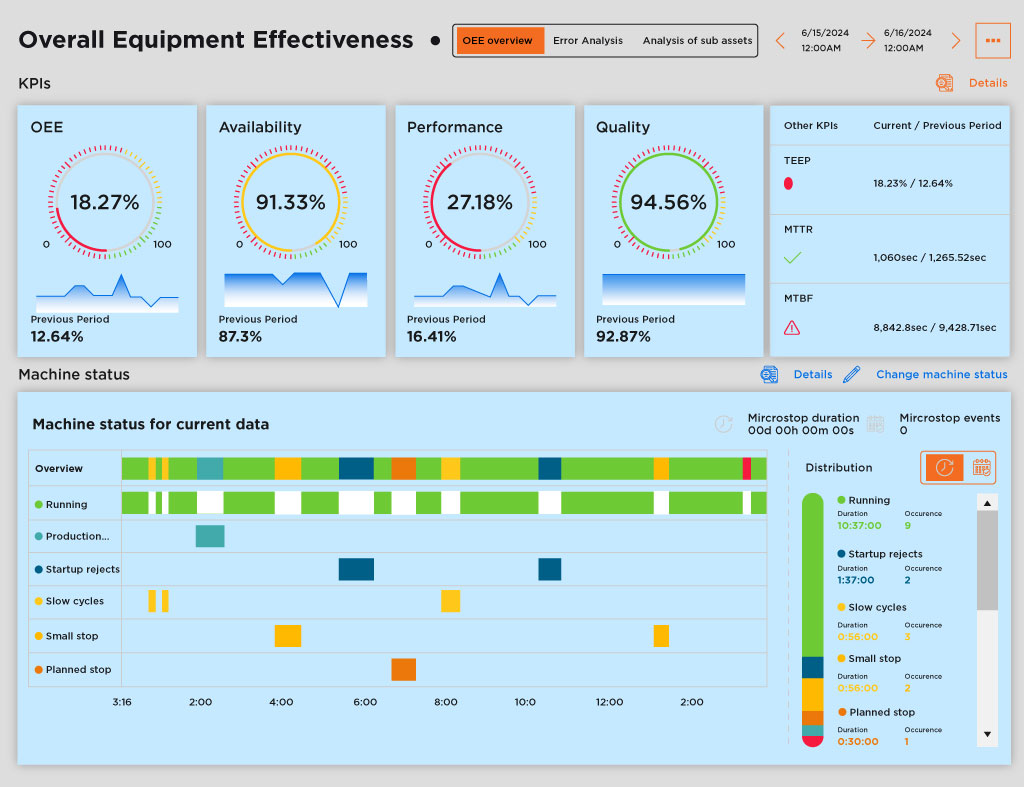With the advent of Industry 4.0, the Industrial Internet of Things (IIoT), and Robotic Process Automation (RPA), manufacturing industries are now harnessing real-time production data to make faster, more informed decisions and drive automation across their operations.
Manufacturers now have access to enormous volumes of data thanks to sensors and edge devices connected to their equipment. This data is transmitted to cloud-based analytics platforms, which process and interpret it much quicker than a human could. The insights derived from this data enable manufacturers to make real-time decisions and significantly improve processes throughout their organizations.
Emerging technologies are creating vast amounts of big data, offering revolutionary insights into manufacturing processes. However, effectively managing this data is crucial; otherwise, companies risk missing out on the benefits. A survey indicates that 96% of companies struggle to leverage big data due to a lack of skills and technology.
Challenges of Inaccurate Data in Manufacturing
Inaccurate data can have severe consequences for manufacturing industries, including:
- Quality Control Problems: Faulty data can result in poor product quality, leading to defects and costly rework.
- Inventory Management Issues: Incorrect inventory data can cause overstocking or stockouts, disrupting production schedules and affecting customer satisfaction.
- Forecasting and Demand Planning: Poor data accuracy hampers accurate demand forecasting, leading to excess inventory or missed sales opportunities.
- Operational Inefficiencies: Incorrect data can delay production schedules, cause equipment breakdowns due to improper maintenance, and lead to inefficient resource allocation.
- Compliance and Regulatory Risks: Manufacturing industries must adhere to strict regulations. Inaccurate data can result in non-compliance, fines, or legal issues.
- Supply Chain Disruptions: Data inaccuracies can affect supplier relationships, logistics planning, and lead times, disrupting the supply chain.
- Cost Overruns: Misallocation of resources, unplanned maintenance, and unexpected downtime can result in cost overruns.
Addressing these challenges requires robust data management practices and the use of technologies like IoT, IIoT, and RPA for real-time data collection and analytics.
Why Manufacturers Need Custom Data Analytics Dashboards

- Tailored Metrics and Key Performance Indicators (KPIs):
- Custom dashboards track specific metrics such as Overall Equipment Effectiveness (OEE), First Pass Yield (FPY), and Mean Time Between Failures (MTBF). These metrics are crucial for assessing production line efficiency, identifying bottlenecks, and optimizing resource use.
- Integration with Manufacturing Execution Systems (MES) and Enterprise Resource Planning (ERP):
- Custom dashboards integrate with MES, ERP, and SCADA systems, allowing seamless data flow from the shop floor to executive decision-making. They provide real-time data on machine performance, inventory levels, and production schedules, enabling quick adjustments based on demand and resource availability.
- Advanced Analytics and Predictive Maintenance:
- Advanced analytics within custom dashboards use machine learning algorithms to predict maintenance needs. These algorithms analyze historical machine data, detect patterns indicating potential failures, and suggest proactive maintenance actions, reducing unplanned downtime and maintenance costs.
- Real-Time Monitoring and Control:
- Custom dashboards offer real-time monitoring and control, displaying live data streams from sensors. This functionality allows operators to quickly detect anomalies, adjust production parameters, and ensure consistent product quality.
- Customization for Industry-Specific Insights:
- Dashboards are tailored to provide role-specific insights. Operators might see metrics on machine uptime, while supervisors review quality control metrics, and executives access aggregated KPIs for strategic decisions.
- Flexibility and Scalability:
- Custom dashboards are flexible and scalable, adapting to evolving manufacturing processes and technological advancements. They support integration with new data sources, facilitating continuous improvement and innovation.
- Cost Efficiency and Competitive Advantage:
- By optimizing efficiency and reducing downtime, custom dashboards help save costs and enhance competitiveness. Manufacturers can respond quickly to market demands, maintain high product standards, and improve customer experiences.
Custom Vs General Data Analytics Dashboards
| Features | Custom Analytics Dashboard | General Data Analytics Dashboard |
| Metrics and KPIs | Tailored to specific manufacturing metrics and KPIs | Broad set of generic metrics and KPIs |
| Visualizations | Industry-specific visualizations | Standard visualizations |
| Integration | Seamless integration with MES, ERP, SCADA | Basic integration with generic data sources |
| Advanced Analytics | Predictive maintenance, quality control analytics | Basic analytics like trend analysis |
| User Customization | Customizable for different roles and departments | One-size-fits-all, limited customization |
| Scalability and Flexibility | Scalable and adaptable to growth and changes | Fixed structure, less adaptable |
| Real-Time Data Access | Incorporates real-time data from production lines | May lack real-time data capabilities |
| Personalization | Personalized for operators, managers, and executives | Generic, not tailored for specific roles |
How Custom Analytics Dashboards Improve Data Accuracy by 30-35%
Custom analytics dashboards can enhance data accuracy in manufacturing by leveraging real-time data and advanced analytics:
- Production Optimization Using AI/ML:
- AI and machine learning algorithms integrate with IoT, IIoT sensors, and ERP systems to provide predictive insights. These models use anomaly detection and regression analysis to forecast potential failures, enabling proactive maintenance strategies that reduce downtime and maintenance costs.
- Results:
- 25-30% increase in production capacity
- 30-35% increase in ROI
- Improved resource allocation
- 25-30% process improvement
- Reduced Downtime Using AI/ML:
- Automated quality control has advanced from basic sensors to sophisticated optical devices. These devices integrate with data systems to enhance precision in operations and stop mechanisms.
- Results:
- 25-30% increase in revenue and cost savings
- 20-25% increase in machine and resource utilization
- Predictable maintenance schedules
- Superior Quality Assurance Using AI/ML:
- Data from sensors, inspections, production, and customer feedback helps identify potential issues and monitor quality metrics in real-time.
- Results:
- 30-35% reduction in defects and waste
- Improved product quality
- Better compliance with standards
- Tool Optimization with AI/ML Integration:
- Big data helps monitor tool performance and predict tool life, allowing for optimal maintenance schedules and root cause analysis of failures.
- Results:
- 25-30% enhanced equipment performance
- 20-25% increase in energy efficiency
- 25-35% increase in productivity and quality
Why AQe Digital is Your Ideal Tech Partner
- Specialized AI and ML Solutions: AQe Digital offers AI and machine learning solutions tailored to the needs of the manufacturing industry, ensuring precision, agility, and scalability in data analytics.
- Cost-Effective AI Strategies: Our solutions optimize costs while enhancing performance, delivering superior ROI and operational efficiency.
- Reliability and Transparency: With over 26 years in the industry, AQe Digital has built a reputation for professionalism and transparency, achieving a 93% client retention rate.
- Personalized Engagement: Our team provides detailed attention to every project stage, ensuring clients have direct access to top executives for the best service and timely delivery.
Conclusion
Custom analytics dashboards offer tailored metrics, advanced analytics, and predictive maintenance capabilities that enable manufacturers to optimize production, reduce downtime, and improve quality control. They integrate seamlessly with MES, ERP, and SCADA systems and offer real-time monitoring and industry-specific insights. Implementing these dashboards can lead to a 25-30% increase in production capacity, a 30-35% boost in ROI, and significant reductions in defects, waste, and downtimes.
If you’re a manufacturer facing challenges in leveraging your data, contact AQe Digital to discover how our solutions can drive your growth and success.



